|
|
|
|
| 2 players, 30 minutes, 12 years and older |
| Author | Sébastien Pauchon (s.pauchon) |
| Illustrator | Alexandre Roche |
| Published by | GameWorks Sàrl |
| Online since | 2013-04-25 |
| Developed by | Kai Aust (kai96) |
| Boardgamegeek | 54043 |
| Complexity | 0/5 |
| Yucata.de owns a license for the online version of this game. A big "thank you" to the copyright owners (publisher and/or author and illustrator) who make it possible to have this game for free online here! |
|
|
|
|
Jaipur
Introduction and Aim of the Game
Jaipur... You are hoping to become the Maharaja's personal trader by being richer than your opponent at the end of each week (round).
To do so, collect and exchange goods (cards) at the market, then sell them for rupees (on the back of the tokens). If you manage
to put together a really good deal (three cards or more), then you'll receive a reward (bonus token).
As for the camels, they are mainly used for exchanges when you want to take multiple goods at the market.
At the end of each round, the richer trader receives a Seal of Excellence. The first
player to collect 2 of these wins the game.
Material
55 goods and camel cards
|
| 6x diamonds |
6x gold |
6x silver |
8x cloth |
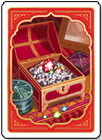
|
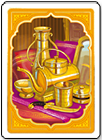
|
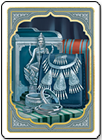
|
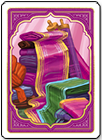
|
| 8x spice |
10x leather |
11x camels |
back |
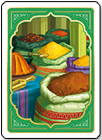
|
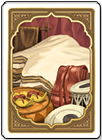
|
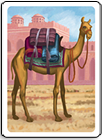
|
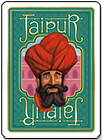
|
| 38 goods tokens |
1 camel token |






|

|
| 18 bonus tokens |
3 Seals of Excellence |



|



|
Set-Up
- Place 3 camel cards face up between the players.
- Shuffle the remaining cards well.
- Deal 5 cards to each player.
- The remaining cards are left face down as a draw pile (deck).
- Take the first two cards from the deck and place them face up next to the camels. (There may well be
1 or 2 camels drawn.) The market is now ready.
- The players then remove any camels from their hands and put them face up in a stack in front of them. This forms
each player's herd.
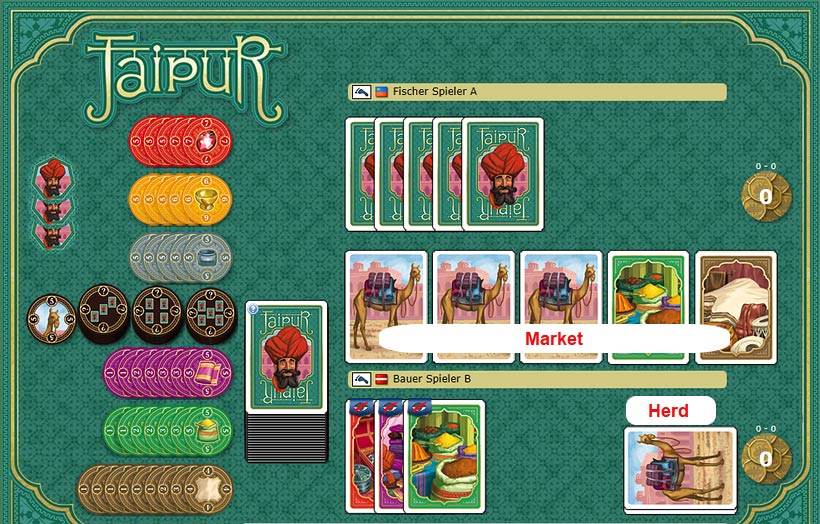
- Sort the tokens by goods type.
- Make a pile for each goods type in descending order of value.
- Spread out each pile so that both players can see all the tokens values.
- Sort the bonus tokens by type (3, 4 or 5 goods). Shuffle each type separately, then
form 3 piles, which are not spread out.
- Put the camel token next to the bonus tokens.
- Set up the tokens as shown in the above illustration.
- Put the 3 Seals of Excellence where the players can get them.
Pick a starting player. You are now ready to start playing.
Game Turn
On your turn, you can either:
TAKE CARDS
OR
SELL CARDS
But never both!
Your turn is now over and your opponent chooses one of these actions.
Take cards
If you take cards, you must choose one of the following options:
- A) take several goods (=Exchange!)
- B) take 1 single good
- C) take all the camels.
A - Take several goods
Take all the goods cards that you want into your hand (they can be of different types), then exchange
the same number of cards. The returned cards can be camels, goods,
or a combination of the two.
B - Take 1 single good
Take a single goods card from the market into your hand, then replace it
with the top card from the deck.
Attention: Players may never have more than 7 cards in their hand.
C - Take the camels
Take all camels from the market and add them to your herd, then replace the cards
taken by drawing from the deck.
Sell cards
To sell cards, choose one type of good and discard as many cards of that type as you like onto the discard pile. Each
sale earns goods tokens and, if the sale is big enough, a bonus.
A sale is carried out in 3 steps:
- Sell as many cards as you want, placing them face up on the discard pile.
- Take as many tokens as cards discarded (starting with the 'top' of the corresponding row, that is,
starting with the highest values.) Stack the tokens in front of you.
- If you sell 3 or more cards, take the corresponding bonus token.
3 cards sold
value: 1, 2 or 3 rupees |
 |
4 cards sold
value: 4, 5 or 6 rupees |
 |
5 or more cards sold
value: 8, 9 or 10 rupees |
 |
Note: The value of a bonus is not known until it is drawn.
Restrictions during sale



|
When selling the 3 most expensive goods (diamonds, gold and silver), the sale must include
a minimum of 2 cards.
This rule applies even if there is only one goods
token of a given type left.
|
Reminder: You can sell one goods type each round, never more.
End of a Round
A round ends immediately if:
-
3 types of goods token are depleted
OR
-
There are no cards left in the draw pile when trying to fill the market.
Scoring
- The player with the most camels in their herd receives the camel token, worth 5 rupees.
- The player turn over their tokens and add them up to determine who is the richer.
- The richer trader takes a Seal of Excellence.
- In the case of a tie, the player with the most bonus tokens takes the seal.
If the players are still tied, the one with the most goods tokens take the seal.
New Round
If neither player has 2 Seals of Excellence yet, set up the game again from the beginning and play a new round.
The player who lost the previous round starts.
End of the Game


|
The game ends immediately as soon as one of the players has 2 Seals of Excellence.
That player wins the game and is appointed as the Maharaja's personal trader. |
Reminders and Notes
- When you take cards from the market, you either take goods or camels, but never both.
- If you decide to take the camels, you must always take all the camels at the market.
- When making an exchange:
- the surrendered cards can be camels, goods or a mixture of the two.
- the same goods type cannot be both surrendered and taken at the market.
- you can never exchange just 1 card from your hand against 1 from the market. An exchange always involves
at least 2 cards for 2 cards.
- If both players have the same number of camels at the end of a round, neither takes the camel token (5 rupees).
- Sometimes there are fewer tokens available than cards during a sale. In that case, you still receive the bonus
token for the number of cards sold.
- Players are not required to let their opponent know how many camels they possess.
At Yucata.de this information is public, because players can count the camels in their minds during the game.
- Camels do not count towards the 7 card hand limit.
Advice
- The use of the camels is a balancing act: if you don't have any then you have a problem if you want to take a lot
of cards and your hand is empty. However, if you take a lot of camels then you risk leaving a very profitable market
for your opponent.
- If you do decide to take a large group of camels, it can be worthwhile doing this when your opponent already has 7
cards in hand. Then, if the new market is interesting, they'll have to exchange cards and probably won't be able to
take all the cards wanted.
- If you think that some valuable cards are due to turn up, it can be advantageous to make an exchange that fills
the market with camels, forcing your opponent to open up the game for you.
- There are three main sources of income: the 3 expensive goods, the first tokens in each set, and the big sales
bonuses. All three are important: don't let your opponent grab the lion's share of the diamonds, gold and silver,
sell before them if you can, and try to make one or two really big sales!
| |